Zondervan Church History Collection (7 vols.)
Digital Logos Edition
Overview
The Zondervan Church History Collection presents seven volumes on the progression, history, and impact of Christianity from the days of Jesus to the present. This collection provides a concise look at the development of the church’s theology in the past 2,000 years, as well as the impact Christianity has had on worldviews and various advances in the Western world—social, scientific, cultural, and more. The Zondervan Church History Collection (7 vols.) links world history to key Christian events, illustrates the life and role of a missionary throughout history, presents a biographical history of the church, and includes numerous revival stories throughout the centuries, illustrating God’s continuous work in human history. Its 3,000 pages of will further your understanding of the history of the church, while encouraging you to make a personal impact on the future of the church—whether big or small.
Please note that this collection is available as part of the Zondervan Bible Reference Bundle 3 (63 vols.).

- Illustrates the impact the church has had in history
- Examines the development of church theology through the centuries
- Presents people and events that have positively impacted church history
- Title: Zondervan Church History Collection
- Publisher: Zondervan
- Volumes: 7
- Pages: 3,248
This title is included in the following collections
You can save when you purchase this product as part of a collection.
Zondervan Ultimate Collection ...
$21,970.44$16,474.99
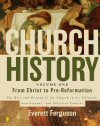
Church History offers a unique contextual view of how the Christian church spread and developed. It did so not in a vacuum, but in a setting of times, cultures, and events that both influenced and were influenced by the church. Church History looks closely at the integral link between the history of the world and that of the church. Volume one explores the development of the church from the days of Jesus to the years prior to the Reformation.
Filled with maps, charts, and illustrations, it offers overviews of the Roman, Greek, and Jewish worlds; insights into the church’s relationship to the Roman Empire, with glimpses into pagan attitudes toward Christians; the place of art and architecture, literature, and philosophy, both sacred and secular; and much more, spanning the time from the first through the thirteenth centuries.
Everett Ferguson (PhD, Harvard) is Professor Emeritus of Bible and Distinguished Scholar-in-Residence at Abilene Christian University in Abilene, Texas, where he taught church history and Greek. He is the author of numerous works, including Backgrounds of Early Christianity, Early Christians Speak, and Inheriting Wisdom: Readings for Today from Ancient Christian Writers. He was also general editor of the two-volume Encyclopedia of Early Christianity.

This is history at its best. From Jerusalem to Irian Jaya is readable, informative, gripping, and above all, honest. It helps readers understand the life and role of a missionary through real life examples of missionaries throughout history. We see these men and women as fallible and human in their failures as well as their successes. These great leaders of missions are presented as real people, and not super-saints.
This second edition covers all 2,000 years of mission history with a special emphasis on the modern era, including chapters focused on the Muslim world, Third World missions, and a comparison of missions in Korea and Japan. It also contains both a general and an “illustration” index where readers can easily locate particular missionaries, stories, or incidents. New design graphics, photographs, and maps help make this a compelling volume. From Jerusalem to Irian Jaya is as informative and intriguing as it is inspiring—an invaluable resource for missionaries, mission agencies, students, and all who are concerned about the spreading of the gospel throughout the world.
This book, now better than ever, has no competition. No one has ever so ably, efficiently, and delightfully linked together the key personalities that portray so dynamically the story of the expansion of our faith from a handful of people in Jerusalem to the very ends of the earth. It is a must-read for all serious believers.
—Ralph D. Winter, Founder, William Carey International University
Ruth A. Tucker (PhD, Northern Illinois University) has taught mission studies and church history at Trinity Evangelical Divinity School and Calvin Theological Seminary. She is the author of dozens of articles and eighteen books.
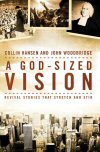
Is it possible we don’t see God working in mighty ways because we don’t ask him to work in mighty ways? Throughout history, God has used revival to build and renew his church. God-Sized Vision challenges us to pray expectantly to see his work in our own day. God can bring revival again to our community, our country, and our world.
Our faith grows stronger when we learn how God worked in the past. The historical stories of worldwide revivals in this book enlarge our hearts and expand our minds as we see God at work in human history with a power that is still available to the faithful today. Here scholars Collin Hansen and John Woodbridge recount the fascinating details of world-changing revivals, beginning with biblical events and continuing through the Reformation, the Great Awakenings, the Welsh and Korean revivals, the East Africa Revival of the 1930s, and more recent revivals in North America and China.
What did these revivals have in common? How can we prepare for—and expect—revival in our own culture? With accessible language and gripping examples, Hansen and Woodbridge explore these questions and more, strengthening our understanding of God’s work while deepening our faith in the possibility of revival—right where we are.
The importance of spiritual revival and the necessity of conversion is being questioned in many evangelical and Reformed circles. I’m so glad that this book is appearing now, as a witness both to how God has worked in the church in the past and what he can do in the future.
—Tim Keller, Pastor, Redeemer Presbyterian Church
We live in immensely serious times, and this book is a serious response that could truly inspire the church to do what it must do in our world today. May God use this to light a fire among his people.
—Chuck Colson, Founder, Prison Fellowship and the Colson Center for Christian Worldview
This book shows how God has moved in extraordinary ways throughout the history of the church. Genuine revival is not the result of marketing, technique, or entrepreneurship. As the stories here show, true revival comes as a “surprising work of God.” When this happens, lives are changed, the church reformed, and the world renewed. How we need such a stirring today!
—Timothy George, Dean, the School of Divinity, Beeson Divinity School
How soon we forget! While we must never despise the ordinary means of grace that God customarily uses in the salvation of men and women, we must not forget those extraordinary times when in his mercy God has seemed to come down and pour out his Spirit in such transforming power that all of our expectations are reduced to rubble in the sheer glory of the transforming presence of God. Yes, many of these movements had downsides and charlatans connected with them—but fair-minded assessment must stand in grateful awe for these “visitations.” May the renewed knowledge of what God has done in the past incite us to prayer that God would do it again.
—D. A. Carson, Professor, Trinity Evangelical Divinity School
. . . Now, along come Collin Hansen and John Woodbridge to give us a panoramic and authoritative history of revival in America—and one that is accessible to every Christian. This is a book that will educate even as it will encourage all believers to pray for a revival of biblical Christianity in our times.
—R. Albert Mohler Jr., President, The Southern Baptist Theological Seminary
. . . few things help reignite the yearning for revival as much as reading books describing God’s work of reviving the church in history. This is what happened to me when reading this book. While reading, I had to stop often to reflect and pray for God to deal with areas in my life which needed his sanctifying, forgiving and healing grace. God reminded me that those who pray for revival must first pray for revival in their own lives. An added value of this book is that it shows how during some revivals the church neglected emphasizing some key biblical themes and the unfortunate consequences of such neglect. . . . May this book challenge Christians to yearn for and pray for the church to experience all that God wishes for it.
—Ajith Fernando, National Director, Youth for Christ
Compacted in this volume are accounts of the awe-inspiring work of God when he moves upon his people in revival power. The story is told by careful scholars who have a gift for making history come alive. Reading the book will lift one to noble thoughts and dreams of greater things. Take it as a rejuvenating vitamin for your soul.
—Robert E. Coleman, Professor, Gordon-Conwell Theological Seminary
Collin Hansen (MDiv, Trinity Evangelical Divinity School) is Editorial Director for the Gospel Coalition. Formerly an associate editor for Christianity Today, he is the author of Young, Restless, Reformed. He has written for Books & Culture, Tabletalk, Leadership, and Christian History & Biography. He has appeared as a commentator on Fox News, and his work has been featured in Time magazine.
John Woodbridge (PhD, University of Toulouse, France) is Research Professor of Church History and History of Christian Thought at Trinity Evangelical Divinity School in Deerfield, Illinois, where he has taught since 1970. He was previously a senior editor of Christianity Today and is the author of Biblical Authority: A Critique of the Rogers/McKim Proposal and coauthor of Letters Along the Way. He is the editor of Great Leaders of the Christian Church and coeditor of works including The Mark of Jesus. Woodbridge is the recipient of four Gold Medallion Awards.
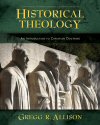
Most historical theology texts follow Christian beliefs chronologically, discussing notable doctrinal developments for all areas of theology according to their historical appearance. And while this may be good history, it can make for confusing theology, with the classic theological loci scattered throughout various time periods, movements, and controversies.
In Historical Theology, Gregg Allison offers students the opportunity to study the historical development of theology according to a topical-chronological arrangement, setting out the history of Christian doctrine one theological element at a time. Such an approach allows readers to concentrate on one tenet of Christianity and its formulation in the early church, through the Middle Ages, Reformation, and post-Reformation era, and into the modern period. The text includes a generous mix of primary source material as well, citing the words of Cyprian, Augustine, Aquinas, Luther, Calvin, Barth, and others. Allison references the most accessible editions of these notable theologians’ work so that readers can continue their study of historical theology through Christian history’s most important contributors. Historical Theology is a superb resource for those familiar with Wayne Grudem’s Systematic Theology or interested in understanding the development of Christian theology.
Gregg Allison is Professor of Theology at the Southern Baptist Theological Seminary and is a recognized expert on Catholicism and historical theology.
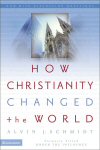
Western civilization is becoming increasingly pluralistic, secularized, and biblically illiterate. Many people today have little sense of how their lives have benefited from Christianity’s influence, often viewing the church with hostility or resentment. How Christianity Changed the World is a topically arranged Christian history for Christians and non- Christians.
Grounded in solid research and written in a popular style, this book is both a helpful apologetic tool in talking with unbelievers and a source of evidence for why Christianity deserves credit for many of the humane, social, scientific, and cultural advances in the Western world in the last two thousand years. Photographs, timelines, and charts enhance each chapter. This edition features questions for reflection and discussion for each chapter.
Honest and realistic . . . a fascinating inspirational experience.
—David O. Moberg, Professor Emeritus of Sociology, Marquette University
Alvin J. Schmidt (PhD, University of Nebraska) retired in 1999 as Professor of Sociology at Illinois College in Jacksonville, Illinois, where he still lives. He is the author of several books, including The Great Divide: The Failure of Islam and the Triumph of the West, and served as a consulting editor for Dictionary of Cults, Sects, Religions and the Occult.
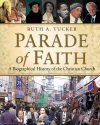
Part storybook, part textbook, part historical overview, Parade of Faith presents the history of Christianity in riveting fashion. Ruth Tucker adopts the metaphor of a parade, journey, or pilgrimage to explore the history of Christianity, which began as the Messiah marched out of the pages of the Old Testament and will end one day when “the saints go marching in” to the New Jerusalem. The book is divided into two chronological groupings: first, the advent of Christianity until the German and Swiss Reformations; second, the Anabaptist movement and Catholic Reformation until the present-day worldwide expansion of the church. Yet, ultimately the topic matter is not movements, dates, or a stream of facts, but instead people—people who still have stories to tell other Christians. And with a little help from clues to their own contexts, they can still speak clearly today.
This book is laid out systematically to showcase the biographies of such prominent figures within their historical settings. The pages are peppered with historical “what if” questions, explorations of relevant topics for today, personal reflections, illustrations, and lists for further reading. Parade of Faith is an excellent introduction for undergraduate students and interested lay readers.
Ruth Tucker is one of the finest storytelling teachers and writers I know.
—Scot McKnight, Karl A. Olsson Professor in Religious Studies, North Park University
Church history at its best—a must for ministers and lay people alike.
—Hutz Hertzberg, Executive Pastor, The Moody Church
The reputation of Tucker as a masterful storyteller is well known.
—Larry Lindquist, Professor, Denver Seminary
Ruth A. Tucker (PhD, Northern Illinois University) has taught mission studies and church history at Trinity Evangelical Divinity School and Calvin Theological Seminary. She is the author of dozens of articles and eighteen books.

People often talk about worldview when describing the philosophy that guides their lives. But how have we come by our worldviews, and what impact did Christianity have on those that are common to Western civilization? This authoritative, accessible survey traces the development of the worldviews that underpin the Western world. It demonstrates the decisive impact that the growth of Christianity had in transforming the outlook of pagan Roman culture into one that, based on biblical concepts of humanity and its relationship with God, established virtually all the positive aspects of Western civilization.
The two-pronged assault in our time on the biblically based worldview by postmodern philosophy and the writings of neo-atheists has made it even more crucial that we acknowledge and defend its historical roots. Unique among books on the topic, this work discusses Western worldviews as a continuous narrative rather than as simply a catalogue of ideas, and traces the effects these changes in worldview had on society. It helps readers understand their own worldviews and those of other people and helps them recognize the consequences that worldviews hold. Professors, students, and armchair historians alike will profit from this book.
This book shows how much of an impact the biblical worldview can have in transforming society. If we follow the example of those who have gone before us in learning to think biblically and to live out the full implications of the gospel, we can have the same impact on our world today. I highly recommend this book.
—From the foreword by Chuck W. Colson
Glenn S. Sunshine (PhD University of Wisconsin) is Professor of History at the Central Connecticut State University and a faculty member of the Centurions Program at Breakpoint, the worldview training ministry of Prison Fellowship Ministries. Previously, he taught at Calvin College and was a visiting professor at the Universität der Bundeswehr-Hamburg (now Helmut Schmidt University) in Germany. He is the author of The Reformation for Armchair Theologians and Reforming French Protestantism, and contributor to the Oxford Encyclopedia of the Reformation and the Encyclopedia of Protestantism.